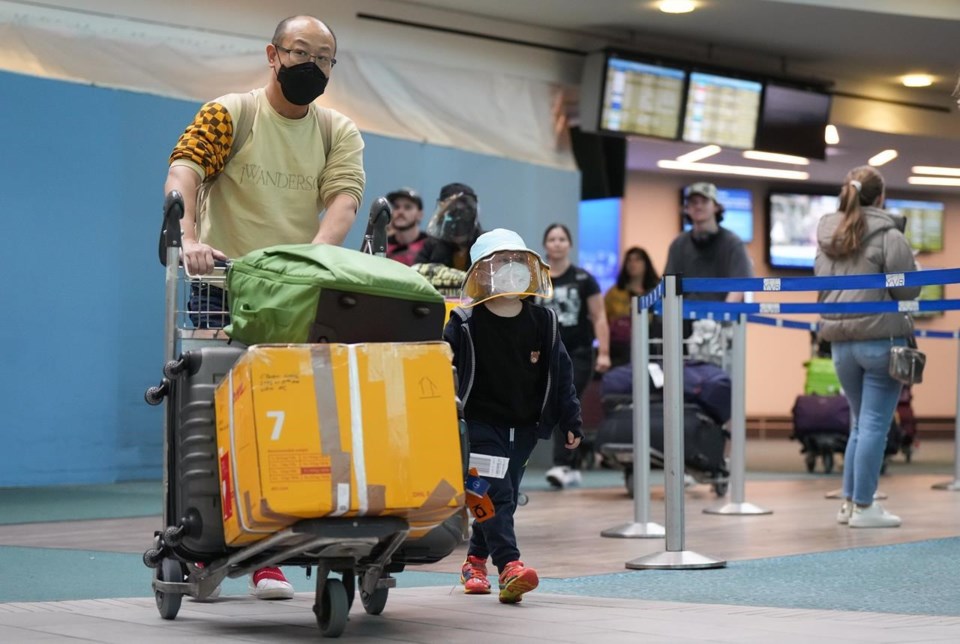VANCOUVER — Travellers arriving in Â鶹´«Ã½Ó³»from Hong Kong said they were relieved to be among the last arrivals before Canada's new COVID-19 testing requirements took effect, including one woman who changed her flight to avoid the rules.
Starting Thursday, from 12:01 a.m. eastern time, Canada will require travellers from China, Hong Kong or Macau to provide evidence of a negative PCR or antigen test within two days of departure.
The new measure, in place for 30 days, is a reaction to a surge in the virus in China and the limited epidemiological and other data available, the Public Health Agency of Canada announced Saturday.
Penny Tao was aboard a Cathay Pacific flight that touched down around 11:30 a.m. Wednesday.
Another Cathay flight was delayed and expected to arrive at 9:02 p.m. local time, just after the rules were to take effect.
Tao said she was planning to visit Canada for Chinese New Year, which occurs on Jan. 22, but when she became aware of the imminent testing rules, she switched to an earlier flight.
She said her schedule was too busy to arrange a test.
"I don't have enough time because the new year is coming up," said Tao, who is planning to tour Â鶹´«Ã½Ó³»and elsewhere with a longtime friend for the next couple of months.
Another passenger on the flight said he felt lucky to be able to return to Â鶹´«Ã½Ó³»without providing test results.
The Canadian citizen, who is returning after more than 20 years working in Hong Kong, asked not to be identified on safety grounds, saying he otherwise felt uncomfortable taking about the situation in China and Hong Kong.
He said the COVID-19 situation was not as severe in Hong Kong as mainland China, where the sudden lifting of pandemic restrictions has led to a surge in cases.
"I think I am the last one to come back to Canada among my friends' circle, most of my friends returned (to Vancouver) over two years ago. I am the last one," said the former British Columbia Institute of Technology student.
He said he was looking "to having high tea and playing mah-jong together" with his friends.
Hong Kong resident Larry Cui was carrying a negative COVID test just in case he was asked to provide it. He wasn't aware until he arrived that he touched down before the rules were to begin.
"I didn't know that. Actually, I did the test yesterday before getting on the plane just in case the Canadian officers here asked me," said Cui.
In Shanghai, Jiayuan Jin was meanwhile preparing to fly to Â鶹´«Ã½Ó³»and be among the first arrivals under the new testing regime.
The Canadian resident is a third-year University of British Columbia student studying economics. But she has been in China since the early days of the pandemic in 2020,studying remotely at UBC, and then as an exchange student at a university in Shanghai.
She was due to arrive in Vancouveron Jan. 7, two days before the term begins.
Jin said in an interview in Mandarin that she planned to take a PCR test before boarding. She said she was confident of testing negative.
She said she supported Canada's new testing rule as a way to keep everyone safe, and the process of getting a COVID-19 test in China was convenient.
"It's easy to book a COVID-19 test. For example, in Shanghai, I'll bump into a COVID-19 test booth every 200 metres and within 10 hours, I could get results," said Jin.
"For people who feel unwell and have COVID-19, they won't be able to enter into Canada. But people who are COVID-free can return to visit their families and continue their life here."
The Chinese government has criticized the testing requirements imposed on passengers from China and threatened countermeasures against countries involved, including the U.S. and several European nations.
“We believe that the entry restrictions adopted by some countries targeting China lack scientific basis, and some excessive practices are even more unacceptable,” Foreign Ministry spokesperson Mao Ning said at a daily briefing Tuesday.
“We are firmly opposed to attempts to manipulate the COVID measures for political purposes and will take countermeasures based on the principle of reciprocity,” she said.
This story was produced with the financial assistance of the Meta and Canadian Press News Fellowship.
This report by The Canadian Press was first published Jan. 4, 2023.
-With files from The Associated Press
Nono Shen, The Canadian Press



